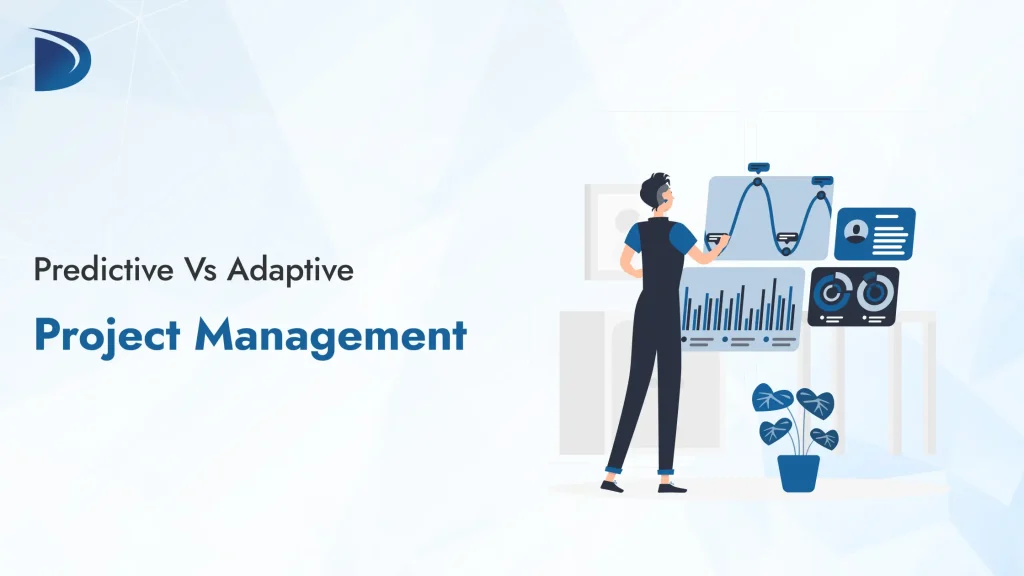Table of Contents
Project management approaches vary in planning, flexibility, and execution. Predictive and Adaptive Project Management take different approaches to managing tasks, timelines, and risks. Predictive follows a structured plan, while Adaptive adjusts to changing needs. In this blog, we will learn about Predictive vs Adaptive Project Management, including key features, benefits, and when to use each method.
Predictive vs Adaptive Project Management – Key Difference
| Aspect | Predictive Project Management | Adaptive Project Management |
| Definition | A structured approach where scope, timeline, and cost are fixed in advance. | A flexible approach that adjusts continuously based on changing needs. |
| Planning | Detailed planning before execution with minimal changes. | Iterative planning with frequent updates based on feedback. |
| Flexibility | Low – follows a strict sequence of steps. | High – plans evolve as the project progresses based on team feedback. |
| Risk Management | Risks are identified early and mitigated through comprehensive planning. | Risks are handled dynamically as they arise, with regular adjustments. |
| Industries Used | Construction, manufacturing, aerospace, and other regulated sectors. | Software development, startups, R&D, and creative industries. |
| Scope | Fixed and well-defined from the start, with limited changes. | It can change or evolve as the project progresses. |
| Milestones | Clearly defined and scheduled in advance. | It can be adjusted as the project moves forward, based on iterations. |
| Project Size | Best suited for large-scale projects with clear objectives. | Works well for smaller, innovative, or exploratory projects. |
| Change Management | Changes are rare and generally not welcomed. | Changes are embraced and expected throughout the lifecycle. |
| Documentation | Extensive documentation is required before and during execution. | Documentation is more flexible and may evolve during the project. |
Choosing the Right Approach: Predictive vs Adaptive Project
Several key factors should guide your decision between Predictive and Adaptive Project Management. Here’s when each approach is most beneficial based on unique project needs:
i) Project Complexity
Predictive Project Management:
- Best for highly complex projects where a clear, structured plan is crucial. For example, construction projects with strict regulations and milestones require fixed plans to maintain quality and safety.
Adaptive Project Management:
- Ideal for more dynamic projects requiring frequent iterations, like software development or innovative startups. These projects benefit from the flexibility to adjust quickly to new ideas and changes.
ii) Customer Expectations and Changes
Predictive Project Management:
- Suited for clients with stable expectations who prefer detailed planning and minimal adjustments. For instance, large infrastructure projects with little room for change are a good fit.
Adaptive Project Management:
- Works well for projects where clients expect frequent feedback and evolving requirements, such as creative industries or product development projects.
iii) Project Deadlines
Predictive Project Management:
- Best for projects with strict deadlines, where it is essential to stay on track with predefined schedules. This works well for projects like manufacturing or aerospace, where delays can have significant consequences.
Adaptive Project Management:
- Suitable for projects with more flexible deadlines, where the timeline can shift as changes are made. Common in tech startups or research and development.
iv) Resource Availability
Predictive Project Management:
- It is ideal when resources are available on a fixed schedule and can be planned accordingly, such as in construction projects where resources must be highly organized.
Adaptive Project Management:
- It is best for projects where resources may need to change based on ongoing feedback, like creative development or software engineering, where teams are adjusted to meet evolving goals.
Pros and Cons of Predictive vs Adaptive Project Management
Pros of Predictive vs Adaptive Project Management
| Aspect | Predictive Project Management | Adaptive Project Management |
| Clear Structure and Plan | Provides a structured approach with a well-defined scope, timeline, and budget. | Offers flexibility with evolving scope, adapting to new insights. |
| Control Over Budget & Time | Managing time and budget with fixed plans and predictable outcomes is easier. | Allows adjustments in budget and schedule as new priorities arise. |
| Resource Allocation | Resources can be allocated efficiently with a defined plan. | Resources can be adjusted dynamically according to project needs. |
| Regulatory Compliance | Best suited for projects in highly regulated industries. | Ideal for industries that value innovation and rapid change. |
| Risk Management | Minimizes risk by planning for potential issues ahead of time. | Adjusts to emerging risks by addressing them as they arise. |
Cons of Predictive vs Adaptive Project Management
| Aspect | Predictive Project Management | Adaptive Project Management |
| Limited Flexibility | Rigid approach: challenging to adapt to changes once the plan is set. | This can lead to confusion due to continuous changes in direction. |
| Difficulty with Changes | Major changes can disrupt timelines, costs, and scope. | Scope creep can occur as changes become frequent throughout the project. |
| Time-Consuming Planning | Requires extensive upfront planning before execution can begin. | This can result in decision fatigue and slower initial progress. |
| Risk of Misalignment | Fixed plans may not align with evolving project needs. | Shifting goals may cause misalignment with stakeholders or team members. |
| Measuring Progress | Progress is easier to track with defined milestones and deliverables. | Progress can be unclear as tasks evolve with each iteration. |
| Resource Management | Resource allocation is straightforward but can be inefficient for changes. | Resource allocation becomes more challenging as the project evolves. |
Conclusion
To wrap up, choosing between Predictive vs Adaptive Project Management depends on your project’s needs. Predictive works well for large projects with fixed timelines and resources, like construction or aerospace, where a clear plan is essential. However, adaptation is better for projects requiring flexibility and frequent changes, such as software development or startups.
Considering factors like complexity, deadlines, customer expectations, and resources, you can decide which approach will best meet your project’s goals.
FAQs
How do the two approaches handle customer feedback?
Predictive Project Management has limited space for customer feedback once the plan is set. Adaptive Project Management actively encourages regular feedback and updates throughout the project lifecycle
What are the main challenges of Predictive and Adaptive Project Management?
Predictive Project Management struggles with rigidity, making adapting to changes or unexpected risks difficult. Adjusting scope, timeline, or resources can cause delays or cost overruns. On the other hand, Adaptive Project Management faces challenges with scope creep, as frequent changes in goals and direction can lead to confusion and misalignment, making it hard to track progress
What types of projects are best suited for Adaptive Project Management?
Adaptive Project Management works best in dynamic environments such as software development, creative industries, R&D, and startups, where flexibility, rapid change, and frequent feedback are essential.

